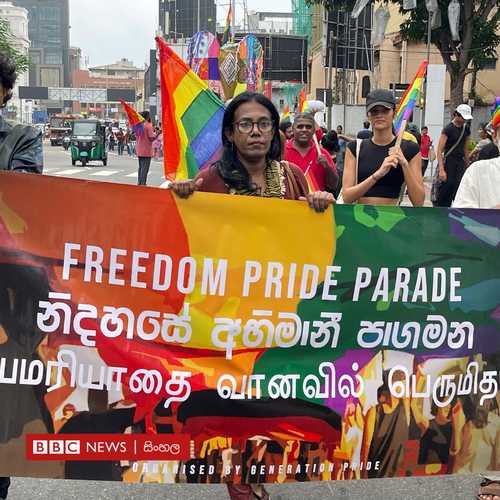By: Isuru Parakrama
June 05, Colombo (LNW): In an era where global narratives are increasingly tainted by division, the importance of LGBTQIA+ Pride has never been more critical. As anti-queer rhetoric surges—fuelled by political agendas, influential figures, and institutional decisions—the celebration of Pride stands as a defiant beacon of resilience, solidarity, and hope.
In Sri Lanka, a nation grappling with its own complex history of identity and equality, Pride is not just a month-long festivity but a vital movement for human dignity that resonates across all communities.
The roots of Pride, born from the Stonewall Riots of 1969, remind us of its revolutionary origins, whilst the interconnectedness of all forms of discrimination underscores why this fight belongs to everyone, not just those who identify as queer.
The Stonewall Riots, sparked on June 28, 1969 in New York City, marked a turning point for LGBTQIA+ rights. When police raided the Stonewall Inn, a haven for queer individuals, the community—led by trans women of colour like Marsha P. Johnson—fought back against systemic oppression.
This uprising birthed the modern Pride movement, transforming grief and anger into a global call for equality. In Sri Lanka, where colonial-era laws like Section 365/365A of the Penal Code still criminalise same-sex relationships, the spirit of Stonewall echoes in local activism. Organisations and collectives combatting these relics of oppression advocate for decriminalisation and societal acceptance, making Pride a symbol of resistance against both legal and cultural barriers.
Today, the urgency of Pride is amplified by a global resurgence of anti-queer sentiment. The Trump administration’s policies, including bans on transgender military service and rollbacks on healthcare protections, have emboldened discriminatory rhetoric worldwide. In Sri Lanka, such global narratives resonate, as conservative voices often cite Western backlash to justify local prejudice. Similarly, Elon Musk’s vocal critiques of “woke” culture have weaponised the term, framing queer visibility as a threat to societal norms.
This rhetoric, amplified on platforms like “X” (previously Twitter), risks normalising hostility towards marginalised groups, including Sri Lanka’s queer community, who already navigate a precarious existence under legal and social scrutiny.
The election of Pope Leo XIV introduces further complexity. Unlike his predecessor, Pope Francis, who famously said, “If a person is gay and seeks God and has good will, who am I to judge?” Leo XIV has expressed opposition to same-sex unions, aligning with conservative factions. This shift, though nuanced, sends ripples to countries like Sri Lanka, where the Catholic Church wields significant influence. Needless to metion that it risks reinforcing traditionalist views that clash with the lived realities of queer Sri Lankans, who face familial rejection and societal stigma.
Meanwhile, the UK Supreme Court’s recent rulings, which have been perceived as legal eradication of transgender identities, further fuel global narratives that erode gender diversity. In Sri Lanka, where transgender individuals face harassment despite promising legislations for medial and legal transitions, such decisions embolden local resistance to inclusive policies.
Pride’s importance lies in its intersectional core. Discrimination does not exist in isolation—homophobia, transphobia, biphobia, and intersex-phobia are intertwined with racism, nationalism, sexism, misogyny, xenophobia, patriarchy, and religious extremism. Kimberlé Crenshaw’s framework of intersectionality illuminates how these oppressions overlap, particularly for queer Sri Lankans of Tamil, Muslim, or Burgher descent, who face compounded prejudice due to ethnicity, religion, or class. For instance, a queer Tamil individual may endure not only homophobia but also ethnic discrimination rooted in Sri Lanka’s post-war tensions. Similarly, patriarchal norms that dictate rigid gender roles amplify the marginalisation of queer women and non-binary individuals, who challenge traditional expectations of femininity and family.
Remember – you do not have to be queer to champion Pride. The fight for LGBTQIA+ rights is a fight for universal human dignity. In Sri Lanka, where communal harmony is fragile, supporting queer rights strengthens the broader struggle against all forms of exclusion.
The 2019 Easter Sunday bombings highlighted the dangers of religious extremism, which often fuels anti-queer sentiment alongside xenophobia. By standing with the queer community, allies challenge the same divisive forces that perpetuate racism or sexism. Pride events in Colombo, though small and often met with resistance, foster spaces where diverse identities—Sinhala, Tamil, Muslim, queer, straight—can unite in shared humanity.
Sri Lanka’s history underscores this interconnectedness. The decriminalisation of homosexuality in India in 2018, following years of activism against Section 377, inspired hope amongst Sri Lankan activists, showing how regional progress can ripple outward.
Yet, challenges remain: the lack of anti-discrimination laws, limited healthcare access for transgender individuals, and societal stigma rooted in colonial and patriarchal legacies. Pride in Sri Lanka is not just a celebration but a call to action—to dismantle systems that oppress not only queer people but anyone deemed “other.”
With the anti-queer rhetoric growing, Pride’s role as a defiant act of visibility becomes paramount. It is a reminder that love, identity, and existence are not crimes. In Sri Lanka, where queer individuals risk arrest, violence, or ostracism, Pride is a lifeline—a space to reclaim joy and demand justice.
This is indeed a call for allies to amplify voices, for policymakers to reform outdated laws, and for communities to reject division. Every right is interconnected; every act of solidarity strengthens the fabric of equality. In a world that seeks to silence, Pride shouts: we are here, we are valid, and we will not be erased.

